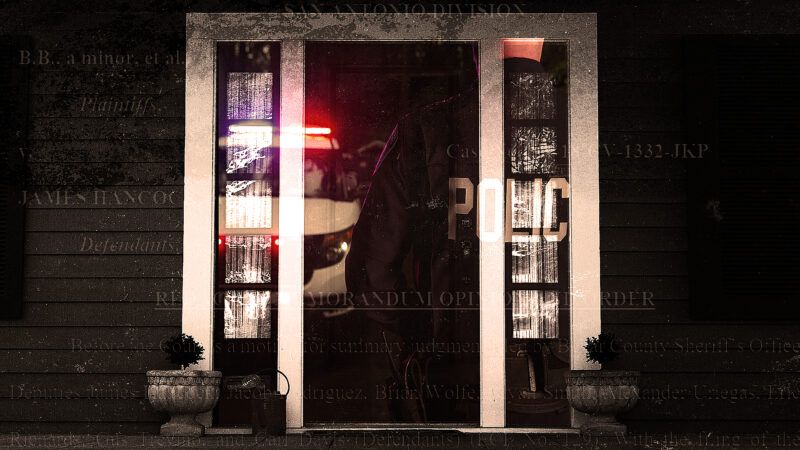Texas Cops Realized They Raided the Wrong House. They Kept Searching Anyway.
Three of the officers were denied qualified immunity, but accountability is a long way off.

In November of 2018, Lucil Basco of Bexar County, Texas, awoke to a thunderous boom, followed by a parade of eight cops barging through her front door. She was handcuffed, and, with her screaming child, removed from the premises. The officers soon realized they made a mistake: They had the wrong house, based on incorrect information from a confidential informant. Yet they continued the operation anyway.
Three of those Bexar County sheriff's deputies—James Hancock, Jacob Rodriguez, and Bryan Smith—are not entitled to qualified immunity, the legal doctrine that allows state actors to violate your rights if the precise scenario in question has not yet been ruled unconstitutional in a prior court precedent. They can thus be sued for it, a federal court said this week.
But the case is a crash course in the levers available to the monopoly on state power—from the drug war, to surveillance, to no-knock entries, to botched warrants—and the importance of government accountability in such circumstances.
The search on Basco's home was a drug raid planned in response to an anonymous source's alleged claim that he or she had reason to believe whoever lived at the residence possessed methamphetamine. In the warrant application, Deputy Rodriguez wrote that the tip came from a "credible and reliable person" and that he had verified it via "personal investigation and/or through discussions with other law enforcement personnel."
It appears the informant was not reliable—something that the source does not even dispute. Under oath, he or she alleges that, along with Deputy Smith, the two zeroed in on the house by process of elimination, and that it was never an unequivocal declaration.
The informant did, however, confirm a photo of the "guard"—the person he or she knew to be occupying the meth house. Rodriguez and Smith's investigation found no connection between Basco and the guard, yet they proceeded anyway. "Beyond the [informant's] say-so," says Judge Jason Pulliam of the U.S. District Court for the Western District of Texas, "the deputies did scant investigation to confirm the assertion that [Basco's address] was a stash house."
Sergeant Hancock then "reviewed the affidavit for [the] search warrant, that everything in the affidavit was true, and that he drove by the house and provided a description of the house for the search warrant," notes Pulliam.
Deputies arrived and broke into Basco's home that evening, despite there being no reason to believe such force was required. Though it appears they did not do the requisite research to confirm she was involved in the drug trade, they did conduct plenty of surveillance: "Officers conducted a traffic stop of Mrs. Basco shortly before the raid during which they searched her vehicle and learned that she is a nurse," writes Pulliam. "And officers were surveilling the home both when Mrs. Basco left to collect her child and when she returned with him."
The officers and the informant disagree about the level of certainty conveyed during the "investigation." But there are a few things that are past debate: "Here, it is undisputed that law enforcement had the wrong address," notes the court. "The video evidence…shows that law enforcement remained in the home after the sweep was concluded….That the home was damaged during the raid is [also] undisputed." Basco was handcuffed, and, according to the video evidence presented to the court, those cuffs were not removed immediately after the cops realized they had targeted an innocent woman.
It is not uncommon for police departments to leverage confidential sources to carry out violent, no-knock raids. The Chicago Police Department, for example, is well-known for its so-called John Doe warrants, based solely on anonymous tips.
In 2019, a cadre of male cops knocked down the door to a Chicago apartment, handcuffing a naked woman while they ransacked her home. The officers elicited nearly 100 misconduct allegations during that one raid because they had the wrong address and had not bothered to do rudimentary verification beforehand. The city has a pile of similar suits.
The raids are not exclusive to Illinois and Texas. Onree Norris was 78 years old when cops with the Henry County Sheriff's Office threw flash-bang grenades into his Georgia home before busting down the door with a battering ram and placing Norris under arrest. He, too, was innocent: The SWAT team meant to target his next-door neighbor. Upon arriving, they confessed that the house looked a bit different than expected, so, without any investigation, they turned their attention to Norris' instead, whose house also did not match the description. Those officers all received qualified immunity, and Norris was thus barred from suing.
Although Basco overcame qualified immunity at the district level, she is still a long way off from seeing any sort of justice or compensation. The state will almost certainly appeal the decision, which is a yearslong process. Presiding over the case will be the U.S. Court of Appeals for the 5th Circuit, which arguably boasts one of the most sordid track records on the subject.
The court granted qualified immunity to a corrections officer who pepper-sprayed an inmate for the fun of it, as well as a group of prison guards who locked a naked inmate in cells covered in feces, sewage, and urine. Those decisions were so egregious that they attracted the eyes of the Supreme Court, which, in a highly unusual move, reversed both of them. Should Basco meet a similar fate in the 5th Circuit, she is unfortunately entitled to no such security.


Show Comments (55)